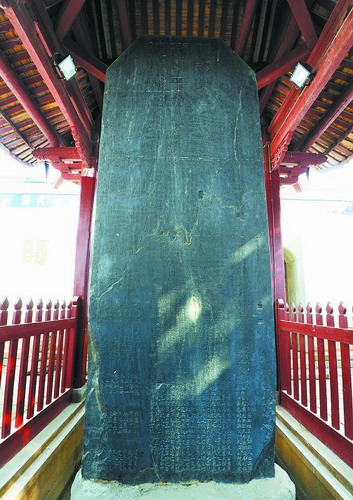

Fuzhou, capital of Fujian province, and a major city in East China began the Silk Road on the Sea of China, serving not only as a path to cultural exchanges between China and foreign countries, but also as an important gateway for commerce.
 |
|
The stone tablet in Minwang ancestral temple, Qingcheng road, Fuzhou, capital city of Fujian province. [Photo by Lu Ting for China Daily] |
Many historical sites in Fuzhou have witnessed the development of the Maritime Silk Road.
In Minwang ancestral temple, Qingcheng Road, Fuzhou city, there is a well-preserved stone tablet, being one of the world’s four tablets inherited from the Tang dynasty(AD618-907), whose inscriptions have recorded in detail the important role Fuzhou played in the development of the Maritime Silk Road.
According to the inscriptions, Wang Shenzhi – emperor of the Min Kingdom, during the Five Dynasties and Ten Kingdoms period, an era of political upheaval in China from AD 907 to 960, between the fall of the Tang Dynasty (AD618-907) and the founding of the Song Dynasty (960-1279) – established strong business ties between Fuzhou and foreign countries.
The marine trade of Fuzhou increased greatly during the reign of Wang Shenzhi and his descendants at the end of the Tang Dynasty. Gradually, Fuzhou became an important port city for the transshipment of goods such as jewelry between China and foreign countries.
Another historical site - Jionglong bridge, in Mawei district, Fuzhou, acted as a significant channel in the Tang Dynasty for freight transport. The well-preserved stone bridge is 66 meters long and 4.6 meters wide. It witnessed the prosperous Maritime Silk Road development in those years and still plays a vital role in stimulating the ocean economy and aquaculture industry to be found nowadays.
Fuzhou still exerted great influence in the maritime trade in the Song Dynasty. “Fujian is the best in shipbuilding and voyages,” went one saying.
Zheng He’s voyages down the Western Seas marked a great adventure in the navigational history of the world, of which, the time spent, the scale and the places visited were all unprecedented in that era.
Fuzhou, with its advantages in location, natural conditions and maritime personnel, was designated as the port for supplies and the starting point for Zheng He’s voyages.
Fuzhou has stood in an increasingly dominant position in sea transport since the middle of the Tang Dynasty when the regular sea routes from Fuzhou to Korea, Japan and Southeast Asia were established.
By Lu Ting from China Daily Fujian Bureau